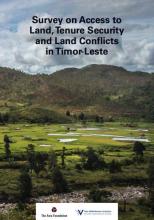Land Library
Bienvenue dans la bibliothèque du Land Portal. Explorez notre vaste collection de ressources en libre accès (plus de 74 000), comprenant des rapports, des articles scientifiques, des articles de recherche, des publications évaluées par des pairs, des documents juridiques, des vidéos et bien plus encore.
/ library resources
Showing items 1 through 9 of 37.Women face many problems with regard to land inheritance and land rights in Kenya. Individual and community land ownership do not favour women. The reason for this is that ownership of land is patrilineal, which means that fathers share land amongst sons, while excluding daughters.
While women’s rights to land and property are protected under the Kenyan Constitution of 2010 and in various national statutes, in practice, women remain disadvantaged and discriminated.
Kenya’s Vision 2030 aims at transforming the country into a newly industrialized middle income country
and infrastructural development is high on the agenda to achieve this. Competing land uses and existing
Globalisation and urbanisation trends in developing countries present both opportunities for growth and development on one hand while contributing to the complex myriad challenges of managing urbanisation on the other hand. Cities and urban areas play a critical in the development of a country.
The need for affirmative action and the mainstreaming of the commons community plus a comprehensive strategy to secure indigenous and community land has become a major global concern of the 21st century.
Land Registration and Administration in Kenya is currently operated on a multi-legal platform [UN 2013]. The Land Registration Act No. 3 of 2012 (LRA) was in that regard enacted to consolidate, harmonize and rationalize land registration goals; which are yet to be achieved.
Article 67(2) (e) of the Constitution of Kenya mandates the Commission to initiate investigation on its own initiative or on a complaint into historical land injustices and recommend appropriate redress.
Continued stability and future development in Timor-Leste are dependent on establishing the necessary legal and administrative mechanisms for providing access to land, land tenure security, as well as preventing and addressing land-related conflict.
This study aimed to pilot an innovative land survey to provide quantitative data regarding landrelated issues in Timor-Leste, in order to support the Timorese government and parliament in developing evidence-based land policies and legislation, as well as more informed advocacy of civil society.








